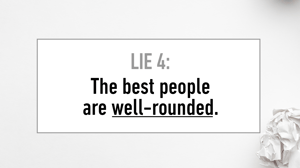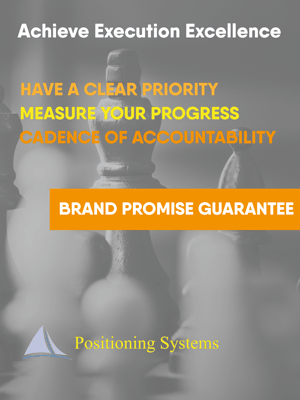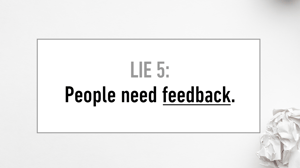 If Excellence is Idiosyncratic, as we shared in Lie #4 The Best People are Well Rounded – BULL - Excellence is Idiosyncratic, how do leaders get the greatest performance from our people?
If Excellence is Idiosyncratic, as we shared in Lie #4 The Best People are Well Rounded – BULL - Excellence is Idiosyncratic, how do leaders get the greatest performance from our people?
We’re sharing Nine Lies About Work: A Freethinking Leader’s Guide to the Real World by authors, Marcus Buckingham and Ashley Goodall.
This continues Lie #4 - The Best People are Well Rounded.
THE SINGLE MOST POWERFUL PREDICTOR OF A TEAM’S PRODUCTIVITY
Of the eight signature conditions of the highest-performing teams (see Nine Lies About Work - #1 People Care Which Company They Work For) one in particular stands out as the single most powerful predictor of a team’s productivity.
It is each team member’s sense that “I have the chance to use my strengths every day at work.”
Ongoing work-strengths fit is the master lever for high-performance teams: pull it, and everything else is elevated; fail to pull it, and everything else is diminished.
Companies are not built to help us pinpoint and then contribute our unique strengths.
In our systems, processes, and technologies, our rituals, language, and philosophies, the evidence is exactly the opposite design: We measure against a standardized model. We even badger our employees to become as like this model as possible.
The ideal performer is built around the lie, “the best people are well-rounded.”
To see the truth, we need to understand two facts.
COMPETENCIES CAN’T BE MEASURED
- Competencies are impossible to measure. Take “strategic thinking” as an example. Is this a state, something variable and subject to flux? Or is it a trait, something that is inherent and relatively stable over time? In the field of psychometrics, these two phenomena are measured quite differently.
When we measure states, we either devise surveys that ask a person about his/her state of mind, or we create tests with right and wrong answers to determine whether a person has acquired the necessary knowledge. These are all states, and we expect them to change over time.
- Traits, on the other hand, are inherent in a person. Extroversion is a trait, for example, as is empathy, and competitiveness, and need for structure. Each of us possesses certain unique predispositions and recurring patterns of thought, feeling, and behavior, and the overwhelming evidence is that, while each of us can learn over time to be more intelligent and effective at contributing through these patterns, the patterns themselves persist throughout our lives.
Traits cannot be measured with a survey or a skills test. Instead, they must be measured using a reliable and validated personality assessment. The two most prevalent kinds of personality assessments are self-assessments (involving several carefully worded statements measured on a strongly agree–to–strongly disagree scale) and situational judgment tests.
Watch Marcus Buckingham’s video on Competencies:
Excellence is a synonym for all-around high ability: well-rounded people are better.This is the lie that underpins the tyranny of competencies, and it is persistent and pervasive.
THREE STRATEGIES TO BUILD GREAT TEAMS
Strategy #1 Get into the outcomes business. Imagine you’re faced with this situation. An experienced engineer is assigned a new hire. He’s complaining. The new hire is arrogant, prickly and worst of all has awful body odor. He wants you to fire him!
This is exactly what happened at Atari. The team lead saw unusual talent in the new hire. He figured the two could work together if they weren’t in the office at the same time. They’ll pass work back and forth.  You see that’s why in Atari’s early days Steve Jobs worked nights.
You see that’s why in Atari’s early days Steve Jobs worked nights.
Define the outcomes you want from your team and its members. Look for each person’s strength signs to figure out how each person can reach those outcomes most efficiently, most amazingly, most creatively, and most joyfully. The moment you realize you’re in the outcomes business is the moment you turn each person’s uniqueness from a bug into a feature.
Strategy #2 Define the adjustable seat. After the Second World War, United States Air Force pilots were crashing at an alarming rate. Fiendishly hard to control and innovative jet-powered planes, made Air Force engineers wonder if the cockpit design might be the problem. Were the controls too hard to reach and operate? Were the standardized cockpit dimensions, created in 1926 in need of revision?  In 1950 a young lieutenant named Gilbert S. Daniels, studying 4063 pilots, realized this wasn’t only a problem of knowing the average, but also one of fit. In addition to his assigned task of calculating the average, he asked himself how many of the pilots in the sample were average-sized? If most of pilots were average-sized, then the new cockpit dimensions would solve the problem.
In 1950 a young lieutenant named Gilbert S. Daniels, studying 4063 pilots, realized this wasn’t only a problem of knowing the average, but also one of fit. In addition to his assigned task of calculating the average, he asked himself how many of the pilots in the sample were average-sized? If most of pilots were average-sized, then the new cockpit dimensions would solve the problem.
Daniels went through the data, pilot by pilot, counting how many of the 4,063 pilots were in the middle 30 percent on all the ten dimensions.
The answer was: none.
There were no average-sized pilots. Even if you looked at just three of the ten dimensions, fewer than 5 percent of the pilots were average sized on all three.
What can you do, then, with all this unfettered diversity?
You do what Daniels advised the US Air Force to do design an adjustable seat. Fit the machine to the pilot, not the other way around.
Do the same with your team! Adjust the outcomes you’re asking individual team members to deliver to better match their idiosyncratic talents.
Strategy #3 Use team technology. There’s a very effective tool for integrating people’s wonderfully imperfect capabilities in the service of a given objective. It’s called a TEAM.
You’re weird, I’m weird. We don’t notice are own weirdness because we spend so much time with ourselves, we don’t see it. The authors explain, “It’s weird that some people love doing things we find excruciating. And when we see someone do something better than we ever imagined possible, it can be confounding, perplexing, astonishing—and also, of course, a source of relief.
 We need to partner with people whose strengths—whose weirdness, whose spikiness—is different from ours if we are to achieve results that demand more abilities than any of us has alone. And this means, in turn, that the more different we are from one another, the more we need one another.
We need to partner with people whose strengths—whose weirdness, whose spikiness—is different from ours if we are to achieve results that demand more abilities than any of us has alone. And this means, in turn, that the more different we are from one another, the more we need one another.
Well-roundedness is a misguided and futile objective when it comes to individual people; but when it comes to teams, it’s an absolute necessity. The more diverse the team members, the more weird, spiky, and idiosyncratic they are, the more well-rounded the team.
Diversity isn’t an impediment to building a great team—rather, it’s the fundamental ingredient without which a great team cannot exist.”
Growth demands Strategic Discipline.
 How do you build an enduring great organization?
How do you build an enduring great organization?
You need disciplined people, engaged in disciplined thought, to take disciplined action, to produce superior results, making a distinctive impact in the world.
Discipline sustains momentum, over a long period of time, to lay the foundations for lasting endurance. It’s the framework for Good to Great:
- Stage 1: Disciplined People
- Stage 2: Disciplined Thought
- Stage 3: Disciplined Action
- Stage 4: Build Greatness
Positioning Systems is obsessively driven to elevate your teams Discipline. A winning habit starts with 3 Strategic Disciplines: Priority, Metrics and Meeting Rhythms. -1.jpg?width=300&name=3%20Disciplines%20of%20Execution%20(Strategic%20Discipline)-1.jpg) Your business dramatically improves forecasting, accountability, individual, and team performance.
Your business dramatically improves forecasting, accountability, individual, and team performance.
Creating Execution Excellence demands creating/defining, understanding, with creativity and DISCIPLINE your Flywheel.
Meeting Rhythms achieve a disciplined focus on performance metrics to drive growth.
Positioning Systems helps your business achieve these outcomes on the Four most Important Decisions your business faces:
|
DECISION |
RESULT/OUTCOME |
|
PEOPLE |
|
|
STRATEGY |
|
|
EXECUTION |
|
|
CASH |
|
We help your business Achieve Execution Excellence.
Positioning Systems helps mid-sized ($5M - $250M) business Scale-UP. We align your business to focus on Your One Thing! Contact dwick@positioningsystems.com to Scale Up your business! Take our Four Decisions Needs Assessment to discover how your business measures against other Scaled Up companies. We’ll contact you.
 Next Blog – Lie #5 – People Need Feedback
Next Blog – Lie #5 – People Need Feedback
The established consensus is people need feedback. Facebook’s Mark Zuckerberg and COO Sheryl Sandberg share their relationship is based on giving each other candid feedback. Do we grow through feedback? What exactly drives our development? Next Blog Lie #5 - People Need Feedback






.jpeg?width=150&height=135&name=Hand%20with%20marker%20writing%20the%20question%20Whats%20Next_%20(1).jpeg)

